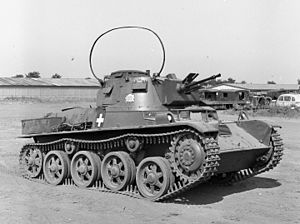Toldi (tank)
| 38M Toldi | |
|---|---|

command 38M Toldi I or II with antenna
|
|
| Type | Light tank |
| Place of origin | Kingdom of Hungary |
| Service history | |
| Used by | Kingdom of Hungary |
| Wars | World War II |
| Production history | |
| Produced | 1939–1942 |
| No. built | 202 |
| Variants | Toldi I, Toldi II, Toldi IIa, Toldi III |
| Specifications | |
| Weight | Toldi I: 8.5 t Toldi IIa: 9.3 t |
| Length | 4.75 m (15 ft 7 in) |
| Width | 2.14 m (7 ft 0 in) |
| Height | 1.87 m (6 ft 2 in) |
| Crew | 3 |
|
|
|
| Armour | Toldi I: 20 mm maximum Toldi II: 35 mm |
|
Main
armament |
20 mm gun (Toldi I and Toldi II) 40 mm gun (Toldi IIa and Toldi III) |
|
Secondary
armament |
1x 8 mm machine gun |
| Engine |
Büssing-NAG V8 7.9 litres 155 bhp |
|
Operational
range |
200 km (120 mi) |
| Speed | 47 km/h (29 mph) on road |
|
Steering
system |
clutch braking (all variants) |
The 38M Toldi was a Hungarian light tank, based on the Swedish Landsverk L-60B tank. It was named after the 14th century Hungarian knight Miklós Toldi.
The 38M Toldi was produced and developed under license from Swedish company AB Landsverk between 1939 and 1942. Only 202 were produced.
Toldi tanks entered Hungarian service in 1940. They first saw action with the Hungarian Army against Yugoslavia in 1941.
These tanks were mostly used against the USSR between 1941 and 1944. Because of their light armour, armament and good communications equipment, they were mostly used for reconnaissance. The design was not effective in head-on engagements with Soviet T-34 medium tanks encountered during the early stages of Operation Barbarossa.
Two known surviving 38M Toldi tanks (one Toldi I and one Toldi IIa) are preserved on display at the Kubinka Tank Museum.
...
Wikipedia
